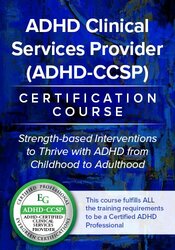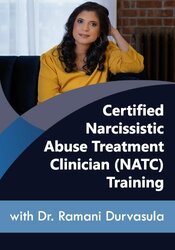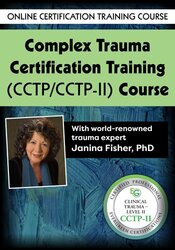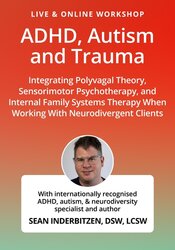Description
Neurodiversity is becoming a popular buzzword in media and social media and is beginning to lack meaning. This course is designed to change that, it draws in what are some Neurodiversity diagnoses and how to work with this specific population's unique traumatic incidents. In this course, you will learn about evidence-based ways for viewing neurodiversity and treating the unique trauma it experiences from a polyvagal informed lens that informs trauma interventions in sensorimotor psychotherapy, internal family systems therapy, and trauma-focused cognitive behavioral therapy. Learn the skills and strategies for differential diagnosis, orienting to treatment, and providing neurodiverse affirming treatment to clients who often go so overlooked by the mental health system.
This product is not endorsed by, sponsored by, or affiliated with the IFS Institute and does not qualify for IFS Institute credits or certification.
CPD
CPD
This online program is worth 6.0 hours CPD.
Speaker
DBA Inderbitzen Consulting Services LLC
Sean Inderbitzen, DSW, LCSW, MINT, has lived 32 years with autism spectrum disorder and is an active clinical social worker within a community health center specializing in the treatment of Autism and co-occurring trauma. He graduated from Tulane School of Social Work in spring of 2023 and was awarded $40,000 by Mayo Clinic to investigate the impacts of increased pediatrician confidence on access to patients suspected of autism spectrum disorder in rural medical settings.
Additionally, Dr. Inderbitzen’s research team (Katie Diebhold, LMSW and colleagues) are studying the effectiveness of Sensorimotor Psychotherapy on children with PTSD and Autism Spectrum Disorder, in consultation with Sensorimotor Psychotherapy Institute, and under the guidance of Dr. Bonnie Goldstein. In addition to research, he maintains an active practice in a community mental health center working with persons on the Autism Spectrum. Dr. Inderbitzen is mentored by such innovators as Dr. Stephen Porges and consults with organizations on autism spectrum disorder and Motivational Interviewing. He is an active member of the Motivational Interviewing Network of Trainers, and his writings can be found regularly featured on Differnetbrains.org, and has a forthcoming book from W.W. Norton, called Autism in Polyvagal Terms.
Speaker Disclosures:
Financial: Sean Inderbitzen has employment relationships with Northlakes Community Clinic and Inderbitzen Consulting Services, LLC. He receives royalties as a published author. Sean Inderbitzen receives grants from Mayo Clinic Health Systems. He receives a speaking honorarium and recording royalties from PESI, Inc. He has no relevant financial relationships with ineligible organizations.
Non-financial: Sean Inderbitzen has a professional relationship with Dr. Stephen Porges.
Objectives
- Build differential diagnosis skills in assessing neurodiversity: ADHD, PTSD, OCD, and ASD.
- Describe Autism in terms of the window of tolerance concept, and be able to provide psychoeducation surrounding the etiology of ASD in this way.
- Place behavioral states and executive functioning abilities in context of social environments including (family, school, child protective services, post-secondary education, workplace, and health maintenance organizations).
- Understand the three step process of cultivating Somatic Resourcing with neurodiverse clients.
- Working with hypervigilant and rational managers through parts with neurodivergent clients.
- Working with limiting beliefs with neurodiverse clients.
Outline
What do we mean by Neurodiversity, and how’s Polyvagal Theory connect?
- Explore diagnosis Autism, Post Traumatic Stress Disorder, Obsessive Compulsive Disorder, and Attention Deficit Hyperactivity Disorder
- Discuss the overlap between the disorders and the shared symptoms (e.g. hypervigilance and hyperactivity)
- Practice assessing case examples to begin to differentially diagnose conditions
- Medical comorbidities for assessment consideration in neurodiverse clients
Psychoeducation for Neurodiversity and Trauma
- What is a polyvagal model of ASD
- How to do psychoeducation on PVT for PTSD and ASD
- Creating your own PVT model of psychoeducation on PTSD and ASD
Executive Functioning and the social context, what is the role of a trauma neurodiversity professional?
- Barkley’s Theory of Executive Dysfunction as it pertains to ASD and ADHD
- Clinical applications of theory of Executive Dysfunction and interpreting behavioral states through: investigating traditional morality and neurodiversity
- Eric Erikson’s theory of Personal In Environment and applying it to EF challenges in various social environments
- Developing a stance towards mezzo challenges related to person in environment settings
Neurodiversity and Sensorimotor Psychotherapy
- Values of Autism in Polyvagal Terms, with specific emphasis on Organicity
- Viewing stimming as a somatic resource
- Building Somatic Resources in neurodiverse clients: a three step clinical process
Neurodiversity and applications of Internal Family Systems Therapy
- What is IFS, and its relationship to ADHD and ASD
- Rational and Hyperactive parts
- Strategies for working with Rational parts
- Strategies for working with Hyperactive parts
Neurodiversity and Trauma Focused Cognitive Behavioral Therapy
- Research and limitations in TF-CBT and ASD
- Social Stories as framing for Trauma storytelling
- Practicing compassion with ASD and ADHD clients
Target Audience
- Psychotherapists
- Trauma therapists
- Applied Behavioral Analysts
- Psychiatrists
*Having some understanding of trauma is a prerequisite for this course.
Reviews
Overall:
4.4
Total Reviews: 16
















